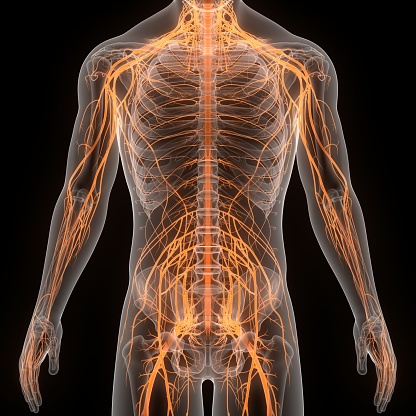
Chiropractic care is well-known for its effects on the muscular and skeletal system, but it also effects the nervous system in a big way. It delivers a powerful regulating effect on the nervous system, helping to reduce tension, inflammation, pain, and dysfunction in the body.
There are 2 main parts to the nervous system:
1. The Central Nervous System: It’s made of the brain and spinal cord and it’s like the computer of your body. It helps the inside of your body process information from the outside through senses such as sight, sound, smell, taste, and touch. It controls voluntary movements like walking and talking and involuntary movements such as breathing, blinking, heart rate, etc. It also creates thoughts and emotions. When your central nervous system is working properly, thinking is clear, all senses receive information effectively, and the body is free of pain.
2. The Peripheral Nervous System: It’s the part of the nervous system that transmits signals from the outside world to your central nervous system for processing and back the other way to make other tissues work accordingly. It’s made up of all the nerves in your body. These signals are carried out in the form of electrical impulses. When this part of the nervous system is functioning properly, the body is strong, there is no weakness, numbness, pain, and the digestion and circulation are working efficiently.
a. The Enteric Nervous System: This is a branch of the peripheral nervous system responsible for controlling signals to the digestive system. It’s made up of a large bundle of nerves that stretch across the entire digestive system and allows the nervous system to communicate to the digestive tract to regulate its activity. If the body is under stress, it can stop the digestive process (common in fight or flight). Inflammation and stress can disrupt digestive function and being under chronic stress can eventually lead to digestive disorders through this dysregulation.
CHIROPRACTIC CARE & THE NERVOUS SYSTEM
Chiropractic care has a therapeutic effect on the nervous system through adjustments, traction, soft tissue manipulation, and other treatments by taking pressure off the nervous system to help regulate and restore the function.
The nervous system is highly responsive to chiropractic care because of the focus that chiropractic places on the spine, the spinal cord, and the nerves that travel through the spine. That is why chiropractic care can:
• Improve cognition (thinking)
• Regulate heart rate and breathing
• Improve digestive function
• Reduce and eliminate pain
• Increase flexibility and mobility in the spine and arms/legs
• Reduce or eliminate headaches and migraines
• Increase energy
• Improve quality of sleep
• Improve balance and coordination
CHIROPRACTIC CARE & PAIN RELIEF
Pain in the body is a sign that there is an imbalance in the nervous system. It often occurs in the neuromusculoskeletal system as a result of a misalignment in the spine, which occurs from posture, overuse, injury, or stress.
When a misalignment occurs, the joints get compressed, and the nerves, muscles, and tissues in the area get inflamed. The muscles will compensate and can further cause additional problems for other parts of the body.
When you get adjusted, the pressure is removed from the nerves, tissues, muscles, ligaments, and tendons, which results in a reduction in pain or discomfort and improvement in the function of the joints and the entire nervous system.
If you’re having any type of pain, discomfort, stiffness, or other symptoms, it means that your nervous system isn’t working at it’s best. That means that you should be checked by your chiropractor.
